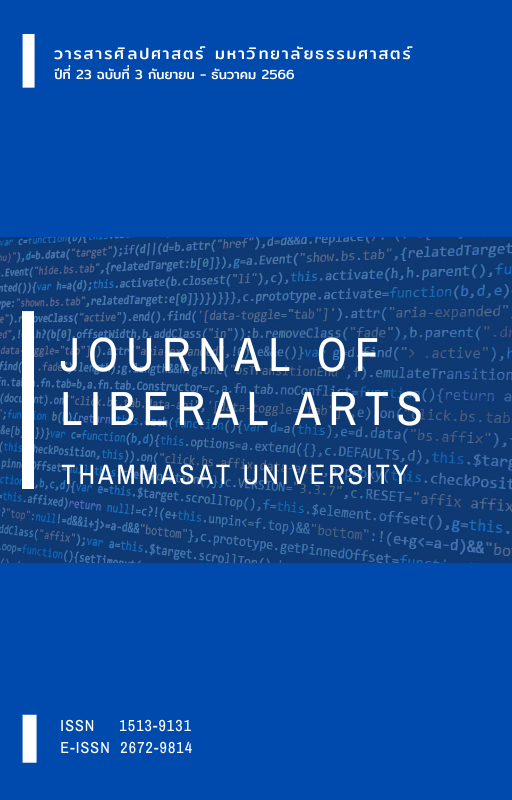ความกตัญญูเป็นเครื่องหมายของคนดี? ผลกระทบของความกตัญญูและผู้มีบุญคุณที่มีต่อความตั้งใจในการรับสินบน
Main Article Content
บทคัดย่อ
“ความกตัญญเป็นเครื่องหมายของคนดี” เป็นคำกล่าวสามัญที่สะท้อนความหมายในเชิงบวกในสังคม แต่ในขณะเดียวกัน ความกตัญญูอาจส่งผลให้บุคคลกระทำผิดเพื่อช่วยเหลือผู้มีบุญคุณ งานวิจัยกึ่งทดลองนี้เพื่อศึกษาผลกระทบของความกตัญญูและผู้มีบุญคุณที่มีต่อความตั้งใจในการรับสินบน นักศึกษาจำนวน 178 คน ตอบแบบสอบถามวัดความกตัญญู หลังจากนั้นจึงสุ่มจำแนกเข้ากลุ่มให้อ่านสถานการณ์จำลอง (ผู้มีและไม่มีบุญคุณ) แล้วให้ประเมินการรับรู้ความมีบุญคุณของตัวละครและความตั้งใจในการรับสินบน ผลการวิจัยพบว่าเมื่อรับรู้ว่าตัวละครในสถานการณ์จำลองมีบุญคุณ ผู้เข้าร่วมการวิจัยตั้งใจที่จะรับสินบนมากกว่า อย่างไรก็ตาม ความกตัญญูไม่มีผลต่อความตั้งใจในการรับสินบน ผลการศึกษาแสดงให้เห็นว่าผู้มีบุญคุณ มีผลให้บุคคลก่อพฤติกรรมต่อต้านสังคมแต่ความกตัญญูไม่มีผล
Downloads
Article Details

อนุญาตภายใต้เงื่อนไข Creative Commons Attribution-NonCommercial-NoDerivatives 4.0 International License.
เอกสารอ้างอิง
ณัฐพล สีวลีพันธ์ และ พีระ ตั้งธรรมรักษ์. (2562). การศึกษาพฤติกรรมการให้สินบนของนิสิตนักศึกษาด้วยวิธีการทางเศรษฐศาสตร์เชิงทดลอง. BU Academic Review, 18(2), 82-98.
บุษกร วัฒนบุตร, พระอุดมสิทธินายก, และ พระมหาภาณุวัฒน์ แสนคำ. (2560). คนดีที่มี ความกตัญญูบนพื้นฐานพระพุทธศาสนา. วารสารสันติศึกษาปริทรรศน์ มจร, 5(Sp1), 77-86.
พระสมพล ถาวโร (ทองรุช), พระครูโกศลอรรถกิจ, พระครูโกศลอรรถกิจ, และ สวัสดิ์ อโณทัย. (2562). แนวทางการประยุกต์ใช้หลักความกตัญญูกตเวทีในสังคมไทยปัจจุบัน. วารสารมหาจุฬานาครทรรศน์, 6(6), 2700-2711.
พระสำราญ ปภสฺสโร และ กฤษฎา นันทเพชร. (2560). รูปแบบการปลูกฝังความกตัญญูกตเวทีสำหรับนักเรียนในสถานศึกษาสังกัดสำนักงานเขตพื้นที่การศึกษาประถมศึกษา จังหวัดนครปฐม. วารสารบัณฑิตศึกษา ปริทรรศน์, 13(3), 269-278.
พิมพ์พนิต ภาศรี, สรณ สุวรรณเรืองศร, กนกวรรณ หวนศรี, กาญจน์สุนภัส บาลทิพย, และ อุมาพร ปุญญโส พรรณ. (2564). การพัฒนาโปรแกรมส่งเสริมความกตัญญูสำหรับนักศึกษาพยาบาล: การศึกษานำร่อง. วารสารพยาบาลสงขลานครินทร์, 41(3). 13-23.
แมคคัลโล, เอ็ม. อี., เอ็มมอนส์, อาร์. เอ., และ ซาง, เจ. (2560) แบบสอบถามความกตัญญู (Gratitude Questionnaire-6, GQ-6) (ทินกร วงศ์ปการันย์ และ ณหทัย วงศ์ปการันย์, ผู้แปล). (ต้นฉบับพิมพ์ปี 2002).
สุวรรณฐา ลึม และ พระปลัดสมชาย ปโยโค (ดำเนิน). (2562). แนวทางส่งเสริมกตัญญูกตเวทีในสังคมไทย. วารสารสันติศึกษาปริทรรศน์ มจร, 7(2), 424-434.
หมอสลดใจ ด.ญ. ถูกญาติ 7 คนชำเราถูกด่าเนรคุณ โพสต์ดึงสติให้แยกแยะคำว่ากตัญญู. (16 มิถุนายน 2563). TNN Online. https://www.tnnthailand.com/news/socialtalk/44166/
Arnett, J. J. (2000). Emerging adulthood: A theory of development from the late teens through the twenties. American Psychologist, 55(5), 469-480. https://doi.org/10.1037/0003-066X.55.5.469
Arnett, J. J., & Mitra, D. (2020). Are the features of emerging adulthood developmentally distinctive? A comparison of ages 18-60 in the United States. Emerging Adulthood, 8(5), 412-419. https://doi.org/10.1177/216769681881007
Bai, B., Liu, X., & Kou, Y. (2016). Belief in a just world lowers bribery intention. Asian Journal of Social Psychology, 19(1), 66-75. https://doi:10.1111/ajsp.12108
Bartlett, M. Y., & DeSteno, D. (2006). Gratitude and prosocial behavior: Helping when it costs you. Psychological Science, 17(4), 319-325. https://doi.org/10.1111/j.1467-9280.2006.01705.
Cressey, D. R. (1953). Other people’s money; a study of the social psychology of embezzlement. Free Press.
Chui, H., & Diehl, M. (2021). Gratitude and loneliness in daily life across the adult lifespan. Current Psychology, 42, 11739-11808. https://doi.org/10.1007/s12144-021-02488-8
De Waele, L., Weißmüller, K. S., & Van Witteloostuijn, A. (2021). Bribery and the Role of Public Service Motivation and Social Value Orientation: A Multi-Site Experimental Study in Belgium, Germany and the Netherlands. Frontiers in Psychology, 12, 655964. https://doi.org/10.3389/fpsyg.2021.655964
Dupuy, K., & Neset, S. (2018). The cognitive psychology of corruption. U4 Anti-Corruption Resource Centre, Chr. Michelsen Institute (U4 Issue 2018:2)
Ekici, A., & Ekici, S. O. (2021). Understanding and managing complexity through Bayesian network approach: The case of bribery in business transactions. Journal of Business Research, 129(1), 757-773. https://doi.org/10.1016/j.jbusres.2019.10.024
Emmons, R. A., & McCullough, M. E. (2003). Counting Blessings Versus Burdens: An Experimental Investigation of Gratitude and Subjective Well-Being in Daily Life. Journal of Personality and Social Psychology, 84(2), 377-389. https://doi.org/10.1037/0022-3514.84.2.377
Hayes, A. F. (2017). Introduction to mediation, moderation, and conditional process analysis: A regression-based approach (2nd ed.). Guilford Press.
Jans-Beken, L., Jacobs, N., Janssens, M., Peeters, S., Reijnders, J., Lechner, L., & Lataster, J. (2020). Gratitude and health: An updated review. The Journal of Positive Psychology, 15(6), 743-782. https://doi.org/10.1080/17439760.2019.1651888
Jiang, W., Liu, H., & Jiang, J. (2021). The development of materialism in emerging adulthood: Stability, change, and antecedents. Personality and Social Psychology Bulletin, 47(2), 293-306. https://doi.org/10.1177/0146167220925234
Lapsley, D., & Hardy, S. A. (2017). Identity formation and moral development in emerging adulthood. In L. M. Padilla-Walker & L. J. Nelson (Eds.), Flourishing in emerging adulthood: Positive development during the third decade of life (pp. 14-39). Oxford University Press.
Li, Y., Luo, L., & Fu, J. (2019). Benefactor intention, perceived helpfulness, and personal responsibility influence gratitude and indebtedness. Social Behavior and Personality: An International Journal, 47(2), 1-15. https://doi.org/10.2224/sbp.7481
Liu, Z., Liu, X., Hong, Y., Brockner, J., Tam, K., & Li, Y. (2017). Is individual bribery or organizational bribery more intolerable in China (versus in the United States)? Advancing theory on the perception of corrupt acts. Organizational Behavior and Human Decision Processes. 143, 111-128. https://doi.org/10.1016/j.obhdp.2016.12.002
McCullough, M. E., Emmons, R. A., & Tsang, J.-A. (2002). The Grateful Disposition: A Conceptual and Empirical Topography. Journal of Personality and Social Psychology, 82(1), 112-127. https://doi.org/10.1037/0022-3514.82.1.112
Nowak, M. A., & Roch, S. (2007). Upstream reciprocity and the evolution of gratitude. Proceedings of the Royal Society B: Biological Sciences, 274(1610), 605-610. https://doi:10.1016/j.jebo.2021.03.008doi:10.1098/rspb.2006.0125
Nwonyi, S. K., Oginyi, R. C., Emma-Echiegu, N., Ofoke, S. M., Elom, E. T., & Chigbo, K. (2019). Personality type, motivation and gender as determinants of corruption engagement. Nigerian Journal of Social Psychology, 2(3), 60-78.
Pritchard, M. S. (1998). Bribery: The concept. Science and Engineering Ethics, 4(3), 281-286. https://doi.org/10.1007/s11948-998-0019-9
Richins, M. (2004). The material values scale: Measurement properties and development of a short form. Journal of Consumer Research, 31, 209-219. https://doi.org/10.1086/383436
Tian, L., Du, M., & Huebner, E. S. (2015). The effect of gratitude on elementary school students’ subjective well-being in schools: The mediating role of prosocial behavior. Social Indicators Research, 122(3), 887-904. https://doi.org/10.1007/s11205-014-0712-9
Watkins, P., Scheer, J., Ovnicek, M., & Kolts, R. (2006). The debt of gratitude: Dissociating gratitude and indebtedness. Cognition & Emotion, 20(2), 217-241. https://doi.org/10.1080/02699930500172291
Whatley, M. A., Webster, J. M., Smith, R. H., & Rhodes, A. (1999). The effect of a favor on public and private compliance: How internalized is the norm of reciprocity?. Basic and Applied Social Psychology, 21(3), 251-259. https://doi.org/10.1207/S15324834BASP2103_8
Wood, A. M., Joseph, S., & Maltby, J. (2008). Gratitude uniquely predicts satisfaction with life: Incremental validity above the domains and facets of the five factor model. Personality and Individual Differences, 45(1), 49-54. https://doi.org/10.1016/j.paid.2008.02.019
Wood, A. M., Froh, J. J., & Gerathy, A. W. A. (2010). Gratitude and well-being: A review and theoretical integration. Clinical Psychology Review, 30(7), 890-905. https://doi.org/10.1016/j.cpr.2010.03.005
Yu, G., Li, S., & Zhao, F. (2020). Childhood maltreatment and prosocial behavior among Chinese adolescents: Roles of empathy and gratitude. Child Abuse & Neglect, 101, 104319. https://doi.org/10.1016/j.chiabu.2019.104319
Zhu, R., Xu, Z., Tang, H., Wang, H., Zhang, S., Zhang, Z., Mai, X., & Liu, C. (2020). The dark side of gratitude: Gratitude could lead to moral violation. Journal of Experimental Social Psychology, 91(1). https://doi.org/10.1016/j.jesp.2020.104048


